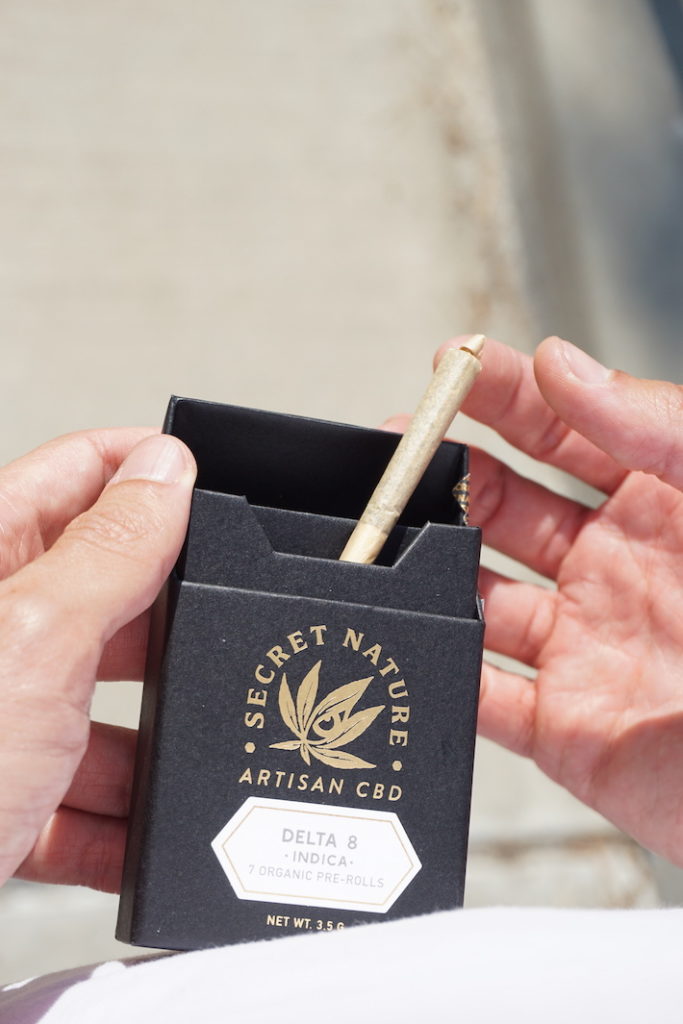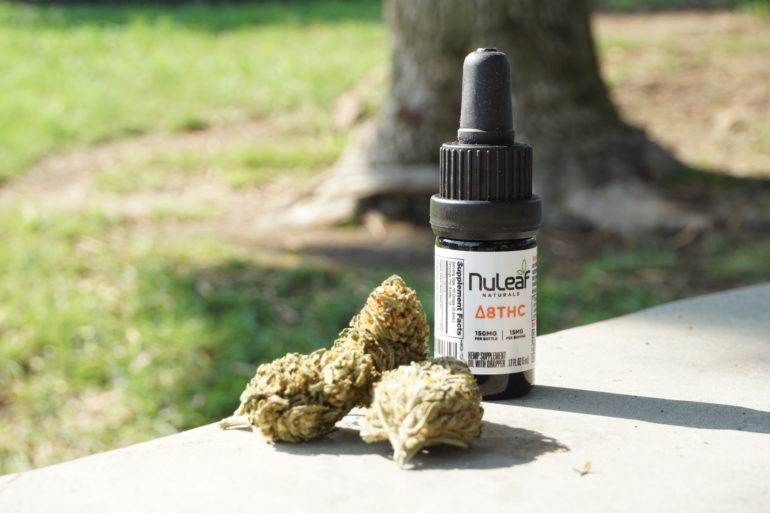CBD and delta-8 THC are both cannabinoids made from hemp. CBD is all-natural and more plentiful than delta-8, a rare form of THC.
Since too little delta-8 is produced by hemp, CBD serves as the commercial building block for delta-8 products with <0.3% delta-9 THC. Thus, delta-8 is considered a “semi-synthetic” product in a legal gray area.
Delta-8 distinctively activates CB1 enough to cause a mild high while CBD doesn’t. However, the rest of their effects notably overlap.
This allows for their reported therapeutic effects for anxiety, stress, depression, chronic and neuropathic pain, inflammation, headache, insomnia, nausea, and more.
What Are the Main Differences Between Delta-8 THC and CBD?
The distinguishing characteristic from cannabidiol (CBD) is the fact that delta-8 can get you mildly to moderately high.
CBD alone does not cause intoxicating effects, which is advantageous to many consumers. Full-spectrum CBD products may have <0.3% THC, which is not enough to cause a high in suggested serving sizes.
Here is a brief summary of what differences you need to know when choosing between delta-8 and CBD products:
Characteristics
- Delta-8 is a distinct form (isomer) of delta-9 THC that causes a milder high
- Delta-8 has an estimated 50-75% potency of delta-9 THC
- CBD is a separate cannabinoid without intoxicating features
- Much more research has been done on CBD than delta-8
- The short and long-term health effects of delta-8 products are not fully known, some recent research has suggested psychosis onset is correlated with delta-8 use
Sourcing
- Delta-8 products are semi-synthetically made using CBD from hemp
- CBD is 100% natural and abundant in hemp
Legality
- Hemp-based CBD products with <0.3% THC are federally legal per the 2018 Farm Bill
- Delta-8 products are hemp-based but over 20 states have explicitly banned it
Drug Testing
- Delta-8 THC use will very likely cause a positive drug test result, though in general are lesser in THC and a milder high than THC
- Repeated use of full-spectrum CBD products can cause a positive drug test
- Broad-spectrum or isolated CBD has little chance of THC cross-contamination
What Are the Possible Benefits and Side Effects of Delta-8 THC?

Delta-8 Benefits
To date, there is only one clinical trial involving delta-8 THC. Conducted in 1995 by the late and legendary Dr. Mechoulam, delta-8 completely prevented vomiting for eight months in eight children aged 3-13 years on chemotherapy.
A recent 2021 survey of delta-8 consumers showed that 51% of participants were using delta-8 THC to treat a health or medical condition. The most commonly reported self-treated conditions were:
- Anxiety or panic attacks (69%)
- Sleep issues or insomnia (40.2%)
- Chronic pain (41%)
- Depression or bipolar disorder (46%)
- Stress (43.5%)
59% of survey respondents took delta-8 to replace or stop their use of a variety of pharmaceutical drugs and substances.
Delta-8 intoxication potency is currently estimated at around 50 to 75% that of delta-9 THC. One must use their own judgment however, as some products are 22 times higher at 6.6% THC than the Federal THC limit of 0.3%. Overall, consumers endorsed a lighter, clearer, and relaxing high with significant pain relief.
For more on the effects of delta-8 THC, read our delta-8 article here.
Delta-8 Adverse Effects
Side effects like anxiety and paranoia are possible but much less likely than delta-9. 74% and 83% of survey participants did not experience any anxiety or paranoia with delta-8.
However, a significant portion still experienced a moderate amount of:
- Difficulty concentrating (81%)
- Short-term memory problems (80%)
- Altered sense of time (74%)
What Are the Possible Benefits and Side Effects of CBD?
CBD Benefits
CBD has the distinction of being the only FDA-approved and naturally-derived cannabinoid. It is non-intoxicating but has over 65 targets in the body.
Pharmaceutical CBD, sold as Epidiolex® (GW Pharmaceuticals), is approved for seizures in pediatric patients with:
- Dravet syndrome
- Lennox-Gastaut syndrome
- Tuberous sclerosis complex
A few other human trials have looked at CBD alone and social anxiety with promising results. However, most studies involving CBD also include THC.
When CBD is in combination with THC (1:1) the synergy allows for expanded potential use in:
- Cancer
- Multiple sclerosis
- Psychiatric disorders
- Chronic pain
- PTSD
- Insomnia
- Psychotic symptoms
- Cognitive impairment
- Schizophrenia
- Anxiety
- Autism spectrum disorder (ASD)
- Attention deficit hyperactivity disorder (ADHD)
- Bipolar disorder
- Tourette Syndrome
Besides these, basic preclinical studies suggest that CBD may also have properties that are neuroprotective, cardioprotective, and anti-inflammatory.
CBD Adverse Effects
A large 2022 meta-analysis compiled data on 3 years of CBD randomized control trials (RCTs) and side effects. They are usually mild to moderate. The W.H.O. reported; “CBD is generally well tolerated with a good safety profile”.
From 2019 to 2022, the most common side effects of CBD in RCTs were:
- Gastrointestinal symptoms (59.5%)
- Somnolence (16.7%)
- Loss of appetite (16.5%)
- Elevated liver enzymes (high ALT/AST) (12.8%)
High liver enzymes (hypertransaminasemia) is technically considered a serious adverse event. However, this was only seen in trials using anticonvulsant medications (e.g. clobazam, valproate) where it seems likely more attributable to those drugs.
Will Delta-8 THC or CBD Show Up on a Drug Test?
Delta-8 THC is one of the next closest forms to delta-9 THC and will most likely cause a positive drug test result. The metabolites are indistinguishable to basic drug testing labs.
CBD products are typically full-spectrum, which contain <0.3% THC. Repeat use of such products may cause a positive drug test result. Broad spectrum or isolated CBD will have near-zero chance of being contaminated with THC.
Are Delta-8 THC and CBD Legal?
Delta-8 products made from CBD were inadvertently made federally legal in 2018. However, since then over 20 states have banned it altogether.
Hemp-derived CBD products with <0.3% THC are federally legal. There are still a few states that may restrict it to medical use or health supplements only.
Conclusion: Delta-8 vs. CBD
Knowing the biggest difference between delta-8 and CBD lets you choose whether you want a soft, euphoric high or stay productive with everyday wellness.
Delta-8 will give you a mild high, while some may prefer the non-intoxicating benefits of CBD to stay sharp.
References (9)
- Kruger, D. J., & Kruger, J. S. (2023). Consumer Experiences with Delta-8-THC: Medical Use, Pharmaceutical Substitution, and Comparisons with Delta-9-THC. Cannabis and Cannabinoid Research, 8(1), 166–173. https://doi.org/10.1089/can.2021.0124
- Britch, S. C., Babalonis, S., & Walsh, S. L. (2021). Cannabidiol: Pharmacology and Therapeutic Targets. Psychopharmacology, 238(1), 9–28. https://doi.org/10.1007/s00213-020-05712-8
- WHO & Louis, R. (2018). CANNABIDIOL (CBD) Critical Review Report Expert Committee on Drug Dependence Fortieth Meeting. https://doi.org/10.13140/RG.2.2.13488.48640
- Abrahamov, A., Abrahamov, A., & Mechoulam, R. (1995). An efficient new cannabinoid antiemetic in pediatric oncology. Life Sciences, 56(23), 2097–2102. https://doi.org/10.1016/0024-3205(95)00194-B
- Kruger, J. S., & Kruger, D. J. (2022). Delta-8-THC: Delta-9-THC’s nicer younger sibling? Journal of Cannabis Research, 4(1), 4. https://doi.org/10.1186/s42238-021-00115-8
- Ranum, R. M., Whipple, M. O., Croghan, I., Bauer, B., Toussaint, L. L., & Vincent, A. (2023). Use of Cannabidiol in the Management of Insomnia: A Systematic Review. Cannabis and Cannabinoid Research, 8(2), 213–229. https://doi.org/10.1089/can.2022.0122
- Miller CR, Burk BG, Fargason RE, Birur B. Delta-8-THC association with psychosis: A case report with literature review. Front Psychiatry. 2023 Feb 20;14:1103123. https://doi.org/10.3389/fpsyt.2023.1103123
- Khan, R., Naveed, S., Mian, N., Fida, A., Raafey, M. A., & Aedma, K. K. (2020). The therapeutic role of Cannabidiol in mental health: A systematic review. Journal of Cannabis Research, 2(1), 2. https://doi.org/10.1186/s42238-019-0012-y
- Reber, J. D., Karschner, E. L., Seither, J. Z., Knittel, J. L., Dozier, K. V., & Walterscheid, J. P. (2022). An Enhanced LC–MS-MS Technique for Distinguishing Δ8- and Δ9-Tetrahydrocannabinol Isomers in Blood and Urine Specimens. Journal of Analytical Toxicology, 46(4), 343–349. https://doi.org/10.1093/jat/bkac007
Editor’s note: This article was originally published on September 8, 2021 and updated on May 16, 2023.
